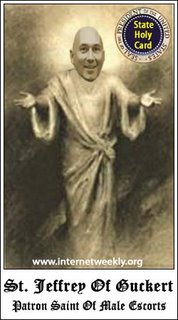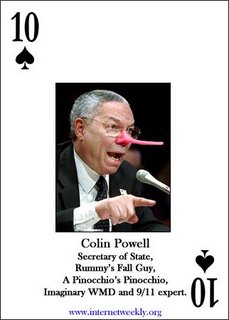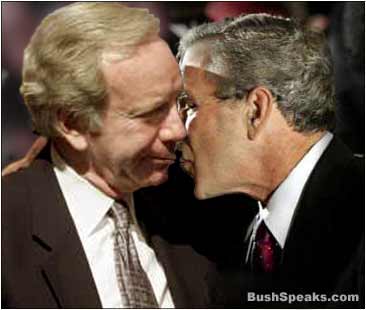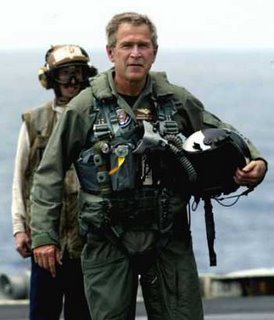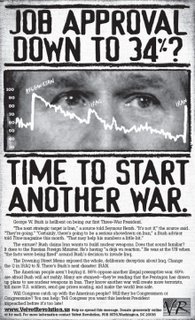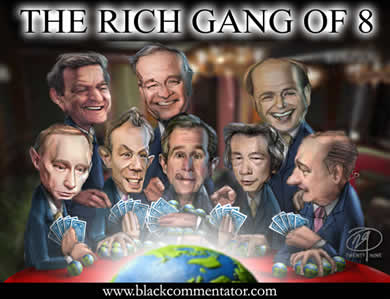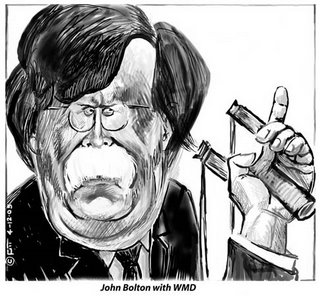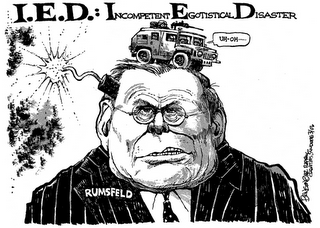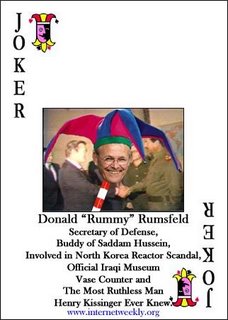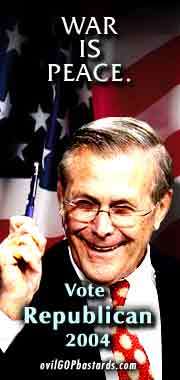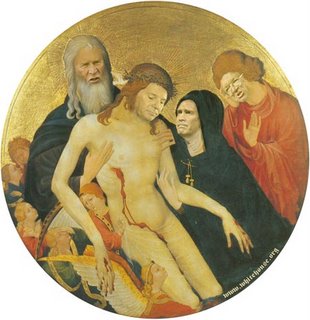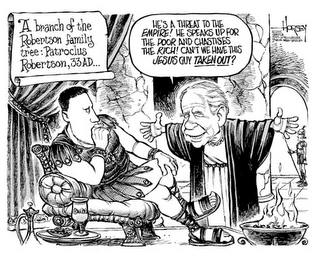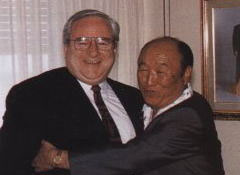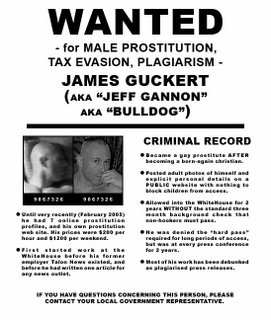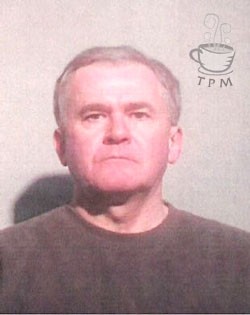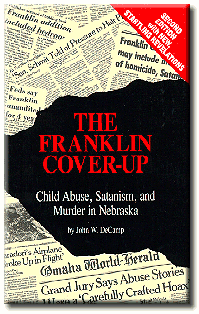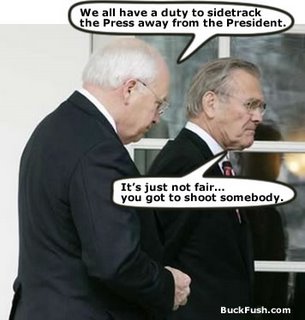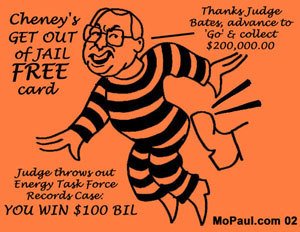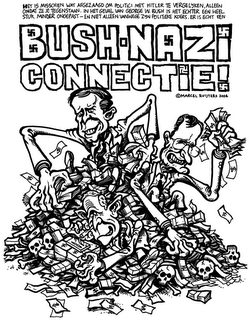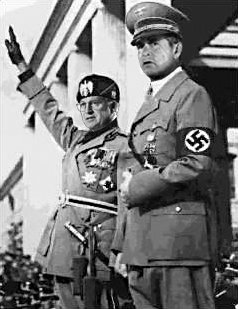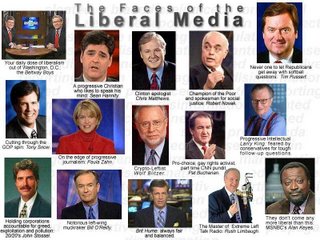 http://www.workingforchange.com/article.cfm?itemid=20855Working for Change
http://www.workingforchange.com/article.cfm?itemid=20855Working for Change covers the farce American media has become under the Bush Administration.
BuzzFlash interview: Eric Boehlert
Calling the White House press corps lapdogs -- and proving it
Remember Whitewater? Travelgate? Ken Starr? And everybody's favorite Clinton quote, "That depends on what the definition of is, is"? The White House Press Corps' reporting of every conceivable Clinton Administration misstep rose quickly to a fevered pitch, and stayed there for eight years. So what happened after January, 2001, when George W. Bush waltzed into Washington?
Journalist
Eric Boehlert asked himself that question, and the result is his carefully researched and fully footnoted new book,
Lapdogs: How the Press Rolled Over for Bush, a
BuzzFlash premium. What happened, as he explains here, involved both effective administration intimidation - and a measure of media collusion. Clinton's "Don't Ask, Don't Tell" policy on gays in the military, somehow became adopted as the inside-the-beltway reporters' mantra. Kind of makes you sentimental for the Watergate era, doesn't it?
* * *
 BuzzFlash
BuzzFlash: You begin your book with a very telling illustration of the transition that's occurred in the press's being accountable to citizens versus the powers that be. You begin with a description of Bob Woodward being questioned by Patrick Fitzgerald. While the whole Plamegate thing was going on, Woodward not only fails to disclose that he had been told about Valerie Plame by Scooter Libby - which seems like an incredible omission, considering this is a criminal case - but he also has been on television saying that this is sort of a second-rate prosecution and unwarranted, and claiming the whole Plamegate thing is an unnecessary investigation. He’s shilling, in essence, for the White House. You quote someone who says this is Watergate in reverse. What do you mean by that?
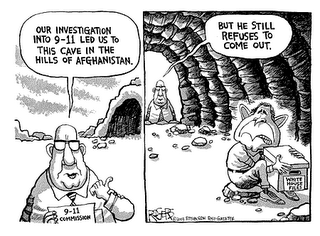 Eric Boelhert:
Eric Boelhert: If all the reporters who knew what was going on early on in the Valerie Plame case - those who got the leaks and the ones that heard secondhand about it – if everyone had just come forward with the information that they had back in September of 2003, when the Washington Post first blew the whistle on the smear campaign, the story probably could have been completely told within six or nine months. Instead, everyone held that information tight.
I think journalists did exactly the opposite of what they’re supposed to do, which is inform the public. The Woodward example was just a mind-blowing situation, where you have perhaps the most famous reporter in Washington sitting on clearly relevant and important information for more than two years. As you say - not only sitting on it, but then disparaging the prosecutor.
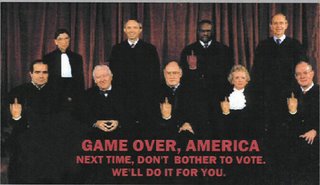
Not only did Woodward sit on that information, but when that story really started to heat up in July of 2005, and when the indictments were released in October 2005, if he had come forward, the heat around that story would have increased tenfold. It was already a very difficult and painful situation for the White House. If Woodward had stepped in and announced that he also had been given the leak, it just would have been a huge political problem for the White House. So you also have to keep in mind the timing, aside from the fact that he simply chose to sit on that information for two years as the criminal case progressed.
Of course, Watergate was the opposite - Woodward with Bernstein. They just pried and pried information out of their sources and relayed it to the public. In Plamegate, he got information dumped in his lap - he claims there was sort of a casual remark. Instead of passing that along to the public, he guarded it for over two years. I also mention that during Woodward’s infamous Larry King appearance on CNN, he tried to conflate, I think, the whole Valerie Plame incident into a debate about anonymous sources. But the story was never about the use of anonymous sources really. As I point out in the book, the key difference was that he used the information that Deep Throat gave him as guidelines. But in terms of the Valerie Plame story, he refused to use the information.

...
Most younger Americans now garner any political news from the Daily Show, where Jon Stewart provides one of the few critical voices in America. (He also produces the Colbert Report, where Stephen Colbert rips up O'Reilly by
being O' Reilly. Warning, if you think at all this will be the biggest comedy rush you have had in some time).
...
BuzzFlash: This guy was half of the team that broke open the Watergate scandal and was key to the resignation of Richard Nixon before his actual impeachment trial. Now he sits on a piece of information relating to Plamegate. Bush’s first reaction when this finally did hit the mainstream press, was, well, I’m going to get to the bottom of this. I’m going to find the leaker. From the very beginning, Woodward is sitting on a piece of information that could blow that out of the water.
Eric Boelhert: Right.
BuzzFlash: Meanwhile, while he’s not disclosing as a reporter what could be a bombshell piece of information, he’s trashing the prosecutor. From our perspective, this is journalistic malfeasance.
Eric Boelhert: There was a lot of criticism of how the media reported the run-up to the Iraq war, but I would make the argument that the press coverage of the Valerie Plame investigation represents the most shockingly bad Beltway journalism. There’s Woodward making his decision not to come forward, despite the criminal investigation. He decided the information he had wasn’t important. He decided what was best, in terms of a criminal investigation that reached to the highest levels of the White House. He decided he was not going to share that information.
And he wasn’t alone. There were almost a dozen reporters in Washington in 2003-2004-2005 who could have broken that story or advanced it in a serious way, and none of them did. There was this race away from the Valerie Plame investigation. I think you mentioned that Bush came out at least symbolically. He said we’re gonna get to the bottom of who leaked this. But he also said in the fall of 2003, I’m not sure we’re going to find out who leaked, because there had been a history of futile attempts at solving leak investigations.
I think the press agreed with Bush – we’re never going to find out who leaked it. The press decided what’s in it for me – why am I going to try to advance the story if it’s going to mean upsetting Karl Rove, if it’s going to mean upsetting Scooter Libby, if it’s going to mean upsetting senior members of the White House who were sitting on a 65-75% approval rating.
I think the race away from the story was unconscionable. For two years, the press could have done its job, and it did not, and it was left to a federal prosecutor to pick up the pieces and ask the simple questions about what was going on.
BuzzFlash: Why, in your opinion, has the press not asked the question of President Bush that Ray McGovern asked of Donald Rumsfeld – Why did you lie us into a war?
Eric Boelhert: That’s a word that they refuse to use.
BuzzFlash: What you’ve just said about the approval rating being high is very important. The press corps is very fearful that if they tell the truth, they will get on the bad side of the White House. We had that incident when Ari Fleischer was still Press Secretary, and as he put it, questions like that are noticed around here. It seemed to send a chill through the press corps. The White House has been very successful at intimidating the press corp. If they know the truth about the Valerie Plame case, they just sit on it. They’re afraid if they tell the truth, the White House will be upset with them. What kind of press corps is that?
Eric Boelhert: Also, think back to the Clinton White House. That was a press corps that essentially existed to get on the bad side of the Clinton White House. If you didn’t attack the Clinton White House, you were ridiculed as a Clinton apologist. That goes for pundits and reporters. Now we have a press corps that, for years and years, has been afraid of upsetting the Bush White House. The double standard is overwhelming.
The Bush White House clearly laid down different rules. They came in with an enormous push-back against the press – with all sorts of creative initiatives to keep information under wraps and to bully the press, and to keep them out of the loop, and to treat them as "another special interest group." What was stunning was the complete lack of spine that the press showed when the Bush White House unveiled this revolutionary communications policy.
Obviously, after 9/11, and then the invasion of Iraq, the press showed even less commitment to trying to deal with a very aggressive Bush White House campaign to diminish the press. I think, even before 9/11, the Bush White House had declared war on the press, and the press surrendered within a matter of days. And I don’t think they thought it was any great defeat. I think they telegraphed, during the 2000 campaign, that there were different standards for Bush and Republicans. A lot of it goes back to the fear of being labeled a liberal media. I think that’s had an extraordinary effect. For the last five or six years, we’ve seen disturbing and concrete examples of what the effect can be.
BuzzFlash: There's something that you don’t emphasize much in the book, but you do point out that you just don’t get ahead in the White House press corps by being critical of the Bush Administration. You get ahead by not upsetting them. The editors or the producers report to people who are the heads of news divisions or the publishers of the paper, who report to the heads of the corporations, who report to the heads of the multi-conglomerate corporations that own the news business. As Sumner Redstone said in 2004 – "I personally like Kerry and would support him, but I’m going to vote for Bush because he’s good for Viacom."
Eric Boelhert: Right.
BuzzFlash: You don’t upset the profitability of Viacom if you work for CBS. You don’t talk about nuclear power plants or defense contractors if you work for NBC, that’s owned by General Electric. You don’t run down Jeb Bush if you work for ABC, because Disney World has gotten tremendous tax relief and legislation out of Tallahassee that favors its profitability. No reporter, unless they have a suicide pact, is going to take on the Bush Administration, because they know that’s not going to advance their career.
The Washington Post and
New York Times both eventually apologized for their coverage of the Iraq war, saying they should have been more aggressive. But, like within the Administration, there were no repercussions. No one was fired. Judith Miller only left because of complications relating to the criminal prosecution, not really her reporting per se. So in essence, it’s the same thing as in the Bush Administration – they never accept the blame. They blame it on the CIA. They say there was misinformation. But there’s no repercussions for the Bush Administration, and there’s no repercussions for the media. No one was held accountable. They have become moderately more aggressive, and they do have occasional stories that expose things about the Bush Administration. We have to be fair. But they don’t seem to connect the dots.
The mainstream press basically adopted the White House line that the Central Intelligence Agency was in chaos after 9/11, which feeds into the myth that they were the ones that provided bad intelligence. And basically, that Porter Goss did a poor job, and the agency needs replacement.
But no one points to Bush and says, you’re goofing up intelligence. The buck never stops with him. He’s never brought into it. Still to this day the mainstream press doesn’t say, the future security of this country is at stake, and we have a real leadership problem from the Department of Defense, to the Vice President, to the White House. Instead, it’s a Porter Goss problem.
Many people forget that The New York Times and the Washington Post with Susan Schmidt were key cheerleaders on Whitewater and the Ken Starr investigation.
One more question. I think the general public and even BuzzFlash readers don’t understand that reporters like yourself all go to editors and have their morning meetings about what to cover. Some meet two to three times a day. Television has a morning assignment meeting. There are all these editorial judgments about what to cover made by news editors. They’re deciding, do we cover this? Do we cover that? How do we cover it? So this notion that journalism is somehow just free of subjectivity is sort of ludicrous.
Eric Boelhert: Right.
BuzzFlash: Let’s go back to the Clinton Administration for an example. An editor at the Washington Post had to be saying to Susan Schmitt – yeah, go ahead. Go full bore ahead. Whatever you get from Ken Starr, put it down there. Check it out, and we’re going with it. That’s an editorial judgment – it’s not an objective process.
Eric Boelhert: Right. Journalism is not a science. It’s incredibly subjective. The problem has been a strong mindset that takes over within the D.C. press corps. The press has been extraordinarily timid with Bush. If you just look back at the same press corps during the Clinton Administration you see that a titanic shift took place on inauguration day in 2001.
During the Clinton years there was this mindset that we can print anything we want – any half-baked allegation – as long as it’s leaked from either a prosecutor or Republicans on the Hill. And two and three months later, when nothing pans out and it turns out to be complete fantasy, A, we don’t write about it again, or B, we pretend it wasn’t fantasy and we just keep writing about it as if it were a fact. That was the mindset during the Clinton era, and the mindset during the Bush era is the complete opposite. The mindset did a complete 180.
Now you have just as unsettling and damaging a mindset as during the Clinton years. It’s a completely different standard that they have set down for the Bush Administration. My book simply details how incredibly timid are the standards they use for Bush, coming off the heels of what was probably an unprecedented aggressive standard that they used for the Democrats in the Clinton White House.
BuzzFlash: Eric, thank you for the wonderful book.
Eric Boelhert: Sure.
A BUZZFLASH INTERVIEW
Interview Conducted by Mark Karlin.
* * *
RESOURCES:
Lapdogs: How the Press Rolled Over for Bush (Hardcover) by Eric Boehlert, a BuzzFlash Premium.
Eric Boehlert at Salon.comThe Press vs. Al Gore: How Lazy Reporting, Pack Journalism and GOP Spin Cost Him the Election (Eric Boehlert/Rolling Stone). For more BuzzFlash interviews, see the
archive page.
...
Lest we let CBC or BBC off the hook, why hasn't the money trail from Ralphie Reed, Abramoff to Stephen Harper been covered? OR the fact that the Afghan poppy crop just happens to be the largest in history, or that CIA drug running is legendary (58 million links when I ran a search yesterday). Indeed Harper has contracted the hardware and software for the Canadian Census system to Lockheed Martin, the largest military industrial contractor in the world, who also happens to be on the top 14 firms in human rights abuses, partaking in prison abuse in Iraq.
Ignorance is only bliss for a little while, until you discover what is really being done in your name. Then, I hope the outrage toward the mainstream media results in legal action that cleans it up and restores some integrity to the profession, because right now - they only mirror the thugs and dead enders occupying the White House.
i.e. I just ran a search under "Bush Lies" and look at the result:
Advanced Search Preferences Web
Results 1 - 10 of about
52,200,000 for
Bush Lies. (0.21 seconds)
Sponsored Links
Anti-Bush Shirts and Gear51% is not a mandate.Messages to stop Bush's agenda.www.BeatBushGear.com
Impeach the LiarQuiet Please. Someone is LyingGreat Original Anti Bush Wearwww.cafepress.com/hortex
News results for Bush Lies -
View today's top stories"Kicking Bush is no fun anymore" - Seattle Post Intelligencer - 4 hours ago
Robert Scheer: Wow! Iraqi Leader Takes Bush's Calls - Yahoo! News - 14 hours ago
Columnist Blasts the Bush Administration and the Media - Editor & Publisher - May 23, 2006
The Lies of George W. Bush: Mastering the Politics of DeceptionReviews of the book, excerpts, top ten lies, author profile and forum.www.bushlies.com/ - 44k - May 22, 2006 -
Cached -
Similar pages David CornRove was said to have alerted Bush. Both reports were initially on ... "David Corn's The Lies of George W. Bush is as hard-hitting an attack as has been ...www.davidcorn.com/ - 40k - May 23, 2006 -
Cached -
Similar pagesBush Lies...Bush Watch: keeping an eye on the native Texas rascal.www.bushwatch.com/bushlies.htm - 74k -
Cached -
Similar pagesTop 10 Bush LiesTop 15 Lies of the Bush administration plus Lies AZ covering all issues except Iraq and 9-11.www.bushlies.net/ - 2k - May 23, 2006 -
Cached -
Similar pagesbush lies.This blog attempts to track and document the unfathomable dishonesty of the current Occupant of the White House and his minions.bush-lies.blogspot.com/ - 34k -
Cached -
Similar pagesA Chart of Bush Lies about Iraq - A BuzzFlash Reader CommentaryA Chart of Bush Lies about Iraq. A BUZZFLASH READER COMMENTARY. Did George W. Bush Invade Iraq by Lying? Why did Bush start a war that: ...www.buzzflash.com/contributors/03/07/22_lies.html - 34k -
Cached -
Similar pagesWHO DIES FOR BUSH LIESDetails the human cost of the somewhat controversial push for war and suggests methods of opposition.www.whodies.com/ - 5k -
Cached -
Similar pagesBush Lies, Media SwallowsGeorge Will, a frequent apologist for the lies of Reagan and now Bush, went so far as to insist that Clinton's "calculated, sustained lying has involved an ...www.thenation.com/doc/20021125/alterman - 31k -
Cached -
Similar pagesThe Other Lies of George BushThe President started telling whoppers long before Iraq.www.thenation.com/doc/20031013/corn - 34k - May 23, 2006 -
Cached -
Similar pagesList of George W. Bush LiesBush Lies 3 · OIL (Operation Iraqi Liberation) ... MORE BUSH LIES. Bush's Broken Promises · Bush Watch · Failure Is Impossible · Yucca Mountain Lies ...pearly-abraham.tripod.com/htmls/bushlies1.html - 33k -
Cached -
Similar pagesRather odd don't you think that mainstream media has ignored the overwhelming mountain of evidence against George W. Bush. Whose side are they on ?
 Bush Impeachment - The Illinois State Legislature Is Preparing to Drop a Bombshell
Bush Impeachment - The Illinois State Legislature Is Preparing to Drop a Bombshell 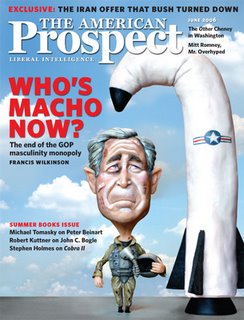
 Daniel Ellsberg, the Marine Commander who worked in the Pentagon and released "the Pentagon Papers" to the press - proved that the Viet Nam war was one based on war profiteering with no basis in fact. Here he is AFTER winning a court case which absolved him from charges relating to releasing classified documents.
Daniel Ellsberg, the Marine Commander who worked in the Pentagon and released "the Pentagon Papers" to the press - proved that the Viet Nam war was one based on war profiteering with no basis in fact. Here he is AFTER winning a court case which absolved him from charges relating to releasing classified documents. THE axis of evil and training ground for terrorism.
THE axis of evil and training ground for terrorism.